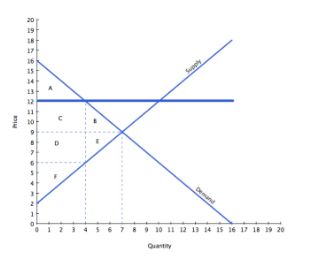Mexico and the members of OPEC produce crude oil. Realizing that it would be in their best interests to form an agreement on production goals, a meeting is arranged and an informal, verbal agreement is reached. If both Mexico and OPEC abide by the agreement, then OPEC's profit will be $200 million and Mexico's profit will be $100 million. If both Mexico and OPEC cheat on the agreement, then OPEC's profit will be $175 million and Mexico's profit will be $80 million. If only OPEC cheats, then OPEC's profit will be $185 million, and Mexico's profit will be $60 million. If only Mexico cheats, then Mexico's profit will be $110 million, and OPEC's profit will be $150 million. You may find it helpful to fill in the payoff matrix below.
src="https://sciemce.com/media/4/ppg__rrr0818190951__f1q384g1.jpg" alt="" style="vertical-align: 0.0px;" height="203" width="377" />In the Nash equilibrium of this game:
A. OPEC cheats on the agreement and Mexico abides by the agreement.
B. both Mexico and OPEC cheat on the agreement.
C. both Mexico and OPEC abide by the agreement.
D. Mexico cheats on the agreement and OPEC abides by the agreement.
Answer: B
Economics
src="https://sciemce.com/media/4/ppg__rrr0818190951__f1q384g1.jpg" alt="" style="vertical-align: 0.0px;" height="203" width="377" />In the Nash equilibrium of this game:
A. OPEC cheats on the agreement and Mexico abides by the agreement.
B. both Mexico and OPEC cheat on the agreement.
C. both Mexico and OPEC abide by the agreement.
D. Mexico cheats on the agreement and OPEC abides by the agreement.
Answer: B
You might also like to view...
An example of an employer tax credit is the EITC
Indicate whether the statement is true or false
If the intended aim of the price floor set in the graph shown was a net increase in the well-being of producers, then positive analysis would have us consider:

A. the policy to be effective if area C is larger than area E.
B. the policy to be effective if area E + B is larger than C +D + F.
C. the policy to be ineffective if area B is larger than area E.
D. the policy to be ineffective if area E + B is larger than A+C+D+ F.
Black markets that operate outside the legal system are often characterized by
a. low profits for suppliers. b. lower opportunity costs for suppliers and buyers. c. decreased prices. d. the use of violence as a means of settling disputes.
The price of a good will fall when:
A. there is a shortage of the good. B. there is a surplus of the good. C. demand for the good increases. D. the supply of the good decreases.